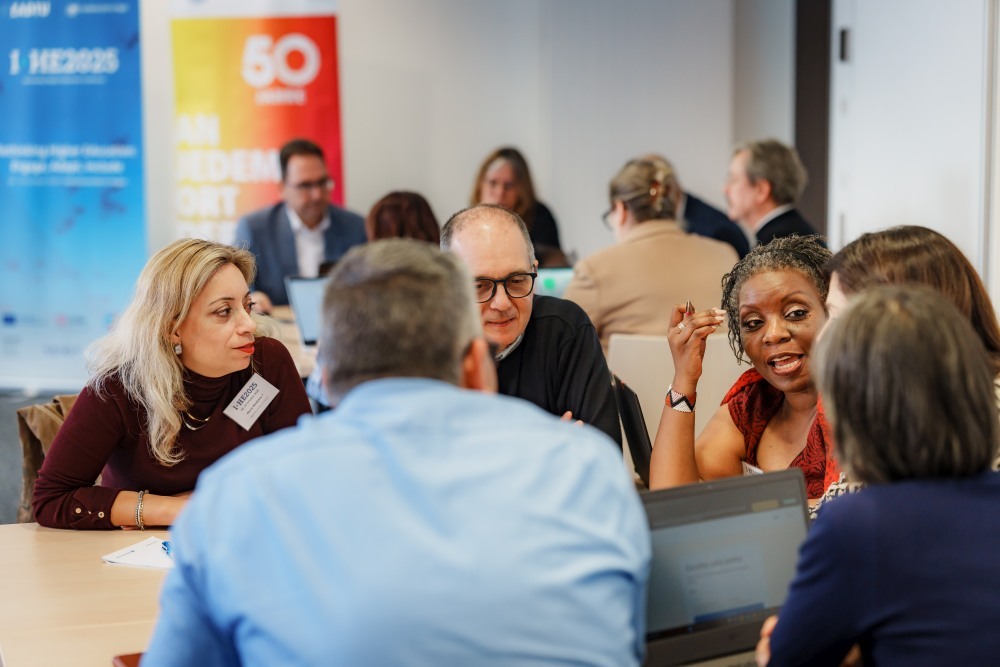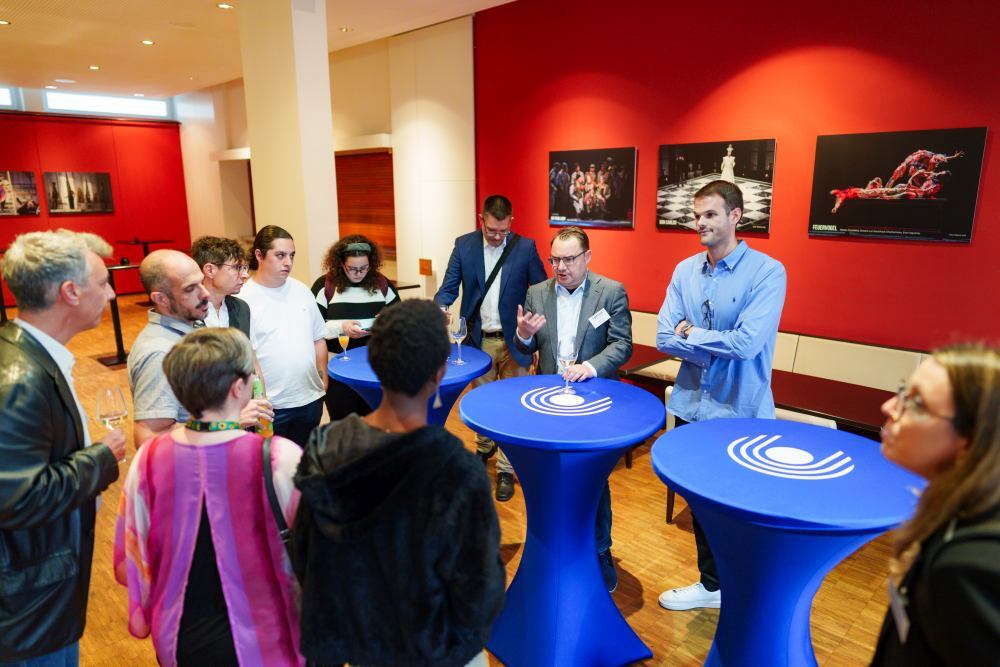EADTU & OpenEU: 230 international guests turned FernUniversität into a living lab
During the conference of the EADTU – European Association of Distance Teaching Universities – FernUniversität was the venue for an engaging and inspiring international exchange.
 Foto: Volker Wiciok
Foto: Volker Wiciok
“We are proud to have welcomed colleagues from all over Europe and beyond to Hagen. This is a milestone for FernUni,” emphasized Rector Prof. Stefan Stürmer at the conclusion. The energy, ideas, and shared commitment to the future of higher education that were evident in the lectures, workshops, and discussions were remarkable.
“With the EADTU, we are part of a strong and visionary network, and through the OpenEU Alliance, we are connected with powerful partners who share our ambition for transformation,” Stürmer summed up. What he would like to see is “sometimes more courage and a faster pace” in order to tackle the known challenges. “But with this network and our alliance partners at our side, we are confident that we will succeed!”
 Fotostrecke
Fotostrecke
Artificial intelligence, micro-credentials, inclusion, and collaboration
The motto of the Innovating Higher Education Conference (I-HE 2025) – “Rethinking Higher Education: Engage, Adapt, Include” – addressed the key issues of our time: the use of artificial intelligence in study and research, new learning pathways through micro-credentials, innovative forms of digital certification, and the question of how higher education in Europe can remain open and accessible.
“We have highlighted strategies for promoting future skills, enabling lifelong learning and, above all, making higher education more inclusive,” said EADTU President Prof. Theo Bastiaens, giving a positive assessment of the conference. Bastiaens, once a professor at FernUni (“Part of my heart will always be FernUni blue”) and now rector of the Open Universiteit in the Netherlands, called for “going beyond traditional boundaries and networking with learners and society – for a stronger sense of purpose.”
From the EADTU Presidium, Prof. Àngels Fitó from the UOC pointed out the political dimensions: “Time is pressing. We must also advocate for better academic education vis-à-vis public institutions. The EADTU is the appropriate platform for this lobbying work.”
We have made strategies visible to promote future skills, enable lifelong learning, and, above all, make higher education more inclusive.
EADTU President Prof. Theo Bastiaens
The role of OpenEU
The role of international alliances became clear during the EADTU, for which there were several dedicated conference formats. The OpenEU alliance, a network consisting primarily of distance learning and open universities, was particularly well represented, with FernUniversität being the only German university actively involved. The diversity of the participating institutions is a great strength of alliances such as OpenEU – it enables mutual learning and joint solutions – also by connecting distance and campus universities and thus creating new forms of cooperation.
Delegations from all cooperating institutions made up the majority of conference participants: from Iceland to Cyprus and Portugal to Latvia. They met to discuss the framework conditions for project work, exchange best practice examples, and, above all, to get to know each other and network. “We are all facing similar challenges. But there was an open and cordial atmosphere for discussion everywhere,” says Sebastian Lauritz, OpenEU project manager at FernUni. “The OpenEU alliance shows how universities in Europe are working together to develop innovative educational programs. The conference brought us closer together on a personal level. This strengthens us as an alliance that sees cooperation at the European level as an opportunity to overcome obstacles at the national level.”
Supporting program with “Student Voices”
The evening program at Theater Hagen offered a special highlight: “Student Voices.” Students from various OpenEU countries shared their perspectives on the future of digital education in short audio clips and made it clear what ultimately matters: innovations and strategies should benefit students, empower them, and prepare them for the challenges of the future.
“Loneliness is the biggest challenge. We must transform distance into connection, create community and belonging. Innovation without human closeness is just isolation,” said one of the contributions – a strong impetus for discussions with the international guests on site.
The networking evening also underscored the close connection between the city of Hagen and FernUniversität. Martina Soddemann, Deputy Mayor for Youth and Social Affairs, Education, Integration, and Culture, welcomed the guests in the theater foyer: “We have been cooperating closely with FernUniversität for some time. Together, we want to tackle challenges in the city – and FernUniversität provides valuable impetus for this.”
Conclusion and outlook
I-HE 2025 turned FernUniversität into a lively place for international exchange, cooperation, and innovation. It made it clear that digital transformation can only succeed if we work together—by exchanging ideas, networking across borders, and jointly committing to ensuring that higher education remains a driver of democracy, social cohesion, and innovation.
The discussions and ideas initiated in Hagen will be continued. The next EADTU conference will take place in The Hague, Netherlands, in 2026. In conclusion, thanks were given to all those involved: the speakers for their expertise, the participants for their input, the organizers at FernUniversität for their work, and the European partners for their ongoing cooperation.


